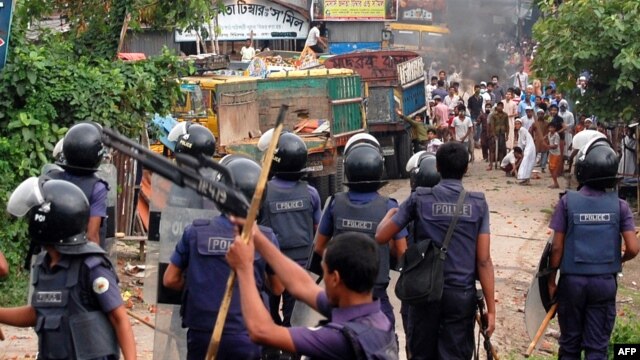By Irving Feng
Impunity Watch Reporter, Asia
DHAKA, Bangladesh – At least 20 Bangladeshi deaths have resulted from a series of violent clashes between Muslim protestors attempting to push for religious reforms and state riot police attempting to quiet the discontent in the streets.

On Sunday, 200,000 Muslims and proponents of Islamic religious change marched in the capital city of Dhaka. The demonstrators were met by state police forces that fired rubber bullets and tear gas into the crowd in an attempt to disperse the mobs.
The demonstrators regrouped the next day, on Monday, and retaliated against the police attacks by hurling stones at city officials. The police again utilized teargas and rubber bullets, as well as water cannons, to try and stop the violence.
The protestors also damaged private and public property during their violent demonstrations by setting fire to vehicles, including at least two police vehicles, and attempted to overrun a police outpost near the edge of the city.
Additional violent clashes erupted in the city of Chittagong in the southeastern portion of the country. Police opened fire with live ammunition rounds at the protestors attempting to overrun their position. Another two protestors were killed in the southern city of Bagerhat.
The violence is a result of political actions perpetrated by the Islamist group “Hefajat-e-Islam” which has urged the government to adopt a new blasphemy law, reinstate a pledge to Allah in their national constitution, adopt a new law that bans women from freely associating with men, and making Islamic education mandatory in schools.
The central government of Bangladesh has resisted the demands of the Islamist group and refuses to make the changes. U.N. Secretary General, Ban Ki-moon has urged the Muslims seeking religious reform in the country to go about their business peacefully and for the central government to respond in kind.
The country has seen a string of violent protests emerge since January of this year. An investigative tribunal was set up in order to probe abuses that were perpetrated by possible war criminals during the 1971 war for independence from neighboring Pakistan. A main Muslim party leader of Jamaat-e-Islami was sentenced to death by the investigative tribunal after the proceedings.
The central party leaders of the Jamaat had been accused of committing the crimes of rape, murder and torture during the war for independence. Jamaat-e-Islami was also a large opponent to the current central government’s push for independence.
Hefajat-e-Islam emerged in the aftermath of the controversial tribunals that condemned the Jamaat-e-Islami party leaders and the new party has also revived the push for strong Islamic, religious reforms that Jamaat once stood for.
For further information, please see:
Irish Independent – Bangladesh rallies leave 20 dead – 6 May 2013
Reuters – At least 20 dead in Islamist protests in Bangladesh – 6 May 2013
Xinhua World News – Bangladesh closes pro-opposition TV channels after 20 killed in police, Islamists clashes – 6 May 2013
Voice of America – 20 Killed in Clashes Between Bangladesh Police, Islamists – 5 May 2013


